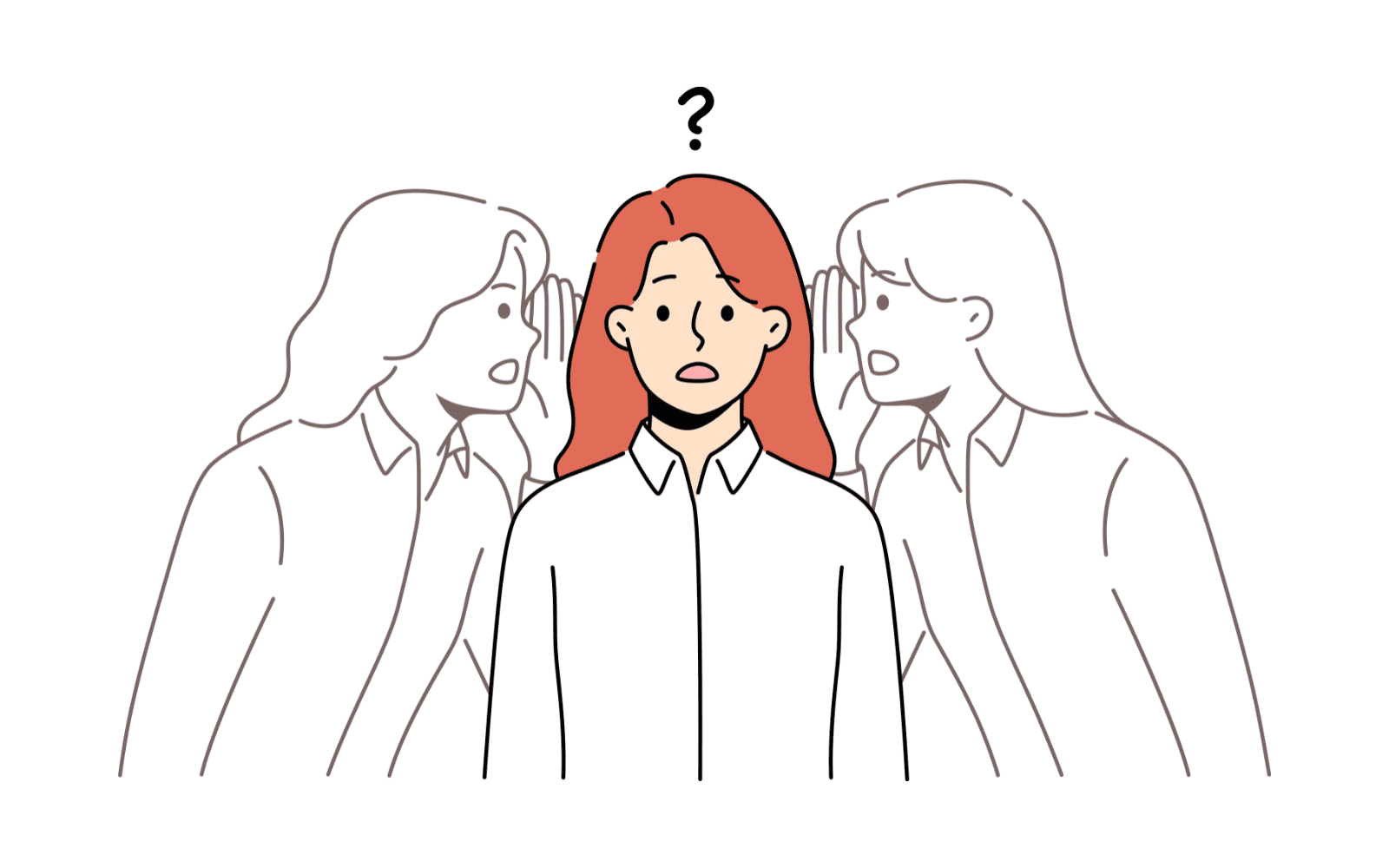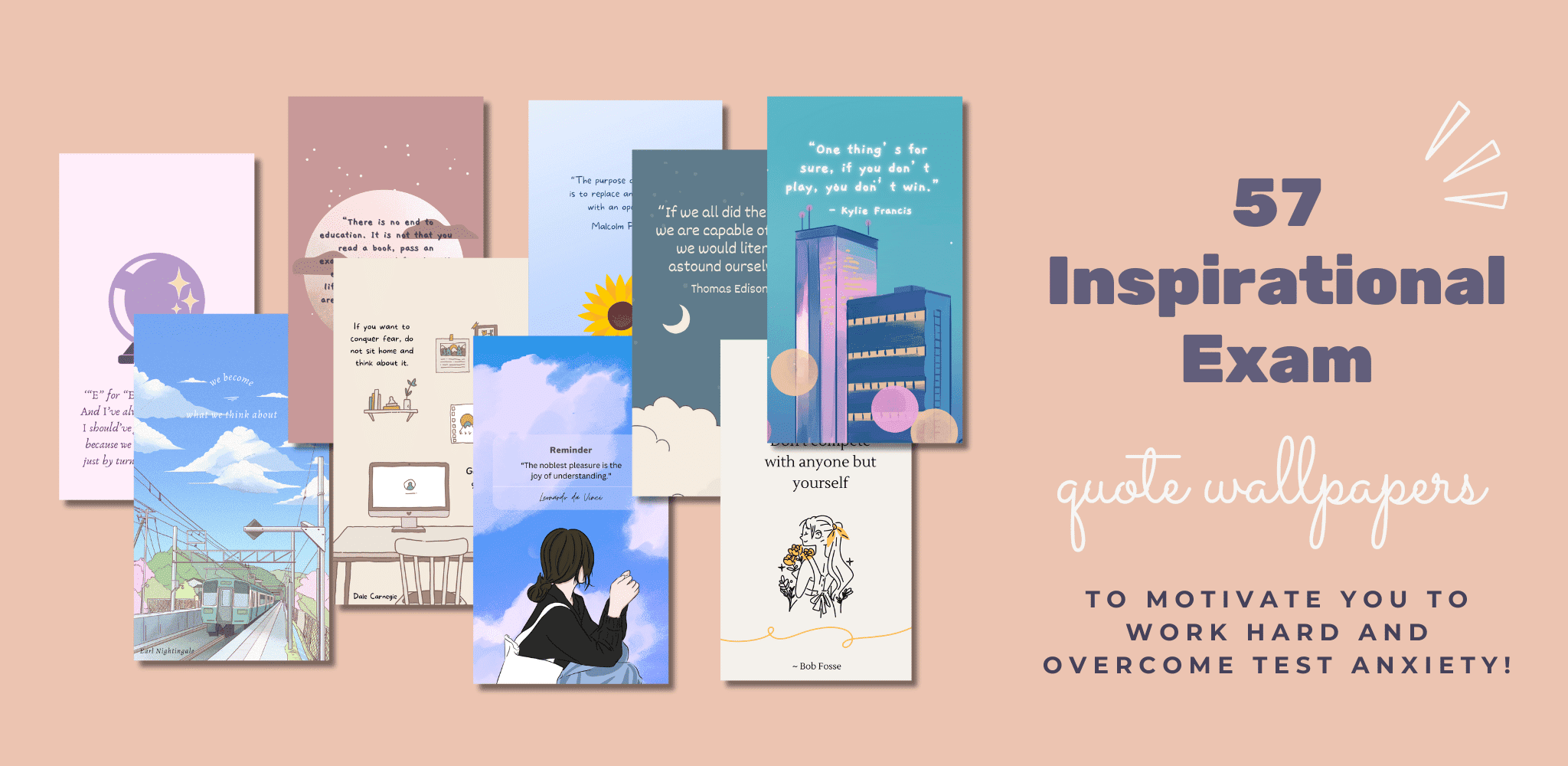
As a student, you can probably relate to the struggle of comparing yourself to others academically:
So-and-so got a higher grade than me on a test, even though I studied more!
So-and-so gets top-notch grades and juggles several extracurriculars, while I’m struggling to get through my calc class!
I’m working so hard, but is my best just not good enough?

I spent a lot of my high school years stressing that I wasn’t “good enough”. If I didn’t get a satisfactory grade on a test, I felt “stupid”. If I wasn’t working, I felt like I was slacking off. If I didn’t get into a program I applied to, I felt like I wasn’t talented enough.
I’ve always been the type of person to set high expectations for myself. Luckily, I grew up with parents who didn’t compare me to other people’s children in an attempt to motivate me. But even though my parents didn’t compare me to my peers, I did.
Ultimately, I felt so burnt out by my senior year that amongst other reasons, I decided to take a gap year. During my gap year, I had lots of time to reflect. It led me to several realizations that helped me fixate less on how I “measure up” relative to other people and find greater peace with myself.
In this post, I’ll be covering:
- Why it’s so hard to break the habit of comparing yourself to others
- Why you need to break the habit (despite how difficult it is)
- How to stop comparing yourself to others academically
- Resources that helped me break the habit
This post may contain affiliate links, which means that when you make a purchase through a link, I make a small commission at no extra cost to you.
Why is It So Hard to Stop Comparing Yourself to Others?
Before getting into how to stop comparing yourself to others, it’s important to understand why you do it. Why is it so hard to accept yourself for who you are? Why are you unable to control feelings of jealousy towards other people?
Reason #1: It’s Part of Human Nature
Humans are social“”we naturally gravitate towards creating organized, cooperative civilizations. Part of being able to come together and create unified organizations means looking to others for standards on how to behave, think, and feel.
Comparison isn’t inherently bad””in fact, it’s necessary for society to function. As you get older, you learn how to respond to social cues by observing the behavior of people around you. You often learn what to value based on what your parents value and what you learn in school.
In short, we need to assess our behavior relative to other people’s so we can develop a social life. However, there is a darker side to comparison.
Reason #2: Everyone Wants to Protect Their Ego
During my gap year, I realized that I compared myself to others academically because I derived my self-worth from comparison.
If I graduated in the top percentile of my class, that meant that I was “smart”. If I got into the program I applied for, that meant that I was qualified.
In short, I compared myself to others using external forms of validation like grades and acceptances because doing so protected my ego. It proved to myself (and to others, I thought) that I was “special” in some way.
However, I’ve come to realize how dangerous it was to derive my self-worth from external forms of validation. That leads me to the next section”¦
Why You Shouldn’t Compare Yourself to Others in School
Comparing yourself to others academically is exceedingly unproductive. Instead of bringing you up, it only drags you down. Here’s how:
Reason #1: You Develop Low Self-Esteem
If you constantly compare yourself to others, your self-esteem will suffer, and as a result, you’ll limit your own potential.
This is unrelated to school, but when I started my blog at the beginning of my gap year, I constantly compared my numbers to other people’s numbers””things like page views, email subscribers, and growth rate. After the first month or two, I realized that my “numbers” weren’t as good as the “numbers” of some other bloggers in my niche when they first started. This was a hard blow to my sense of self-worth. Was I “less capable” than those other bloggers?
(Now I realize how silly this notion was because people don’t want to publicize their failures””they only want to share their successes. Besides, many of those people were trying to sell their blogging courses, so of course they focused on their successes!)

As a result of this fear that I was “inferior,” I held back from investing in new blogging strategies. What if I tried those strategies and I didn’t achieve the same “numerical” success? I would rather remain uncertain about my “true capability” than confront the certainty that I was “inferior”.
You see, my low self-esteem led me to believe that by trying, I would need to confront a terrifying certainty. It made me believe that not trying and remaining uncertain was the better option.
However, my fear of trying new strategies delayed the growth of my blog. It wasn’t until I let go of my fear of failure and disengaged my self-worth from my blogging metrics that I delved into more effective strategies. In doing so, my blog began to experience much faster growth.
The point I’m trying to make is this: by fixating on your failures vs. other people’s successes, you develop low self-esteem. Low self-esteem will hinder you from developing new skills and taking advantage of opportunities that come your way.
In a sense, you become your own nemesis, stunting your personal growth and progress.
Reason #2: You Become a Bitter Person
As I mentioned, one of the reasons we compare ourselves to others is to protect our egos. When we find ourselves “inadequate” by the metrics we use to compare ourselves to others, we feel jealousy.
We begin to feel desperate to find ways to make ourselves feel “special”. This is why jealousy causes us to project our insecurities onto others: by nit-picking other people’s flaws, we make ourselves feel better.
In short, jealousy motivates us to drag others down to raise ourselves up.
Unfortunately, this accomplishes nothing except turn you into a bitter person. Nit-picking other people’s flaws doesn’t help you improve. Time spent envying others is time you could have spent developing your own skills.

Also, constantly comparing yourself to others prevents you from building meaningful, mutually supportive relationships with others. You can never truly be happy for someone else because every success they achieve is a blow to your sense of self-worth. You alienate yourself because you turn everyone else into a competitor (you become entrenched in a you vs. them mindset).
In short, you become embittered by the very net you’ve ensnared yourself in.
Reason #3: You Will Never Be Satisfied
Comparing ourselves to others is a tempting way to derive our self-worth. However, if there’s one thing I’ve come to realize, it’s that comparison will never satiate you.
If you derive your self-worth from comparison, it means you assess your self-worth by external forms of validation””things like grades, awards, or compliments. But the problem with external forms of validation is that they are fragile and needy.
If you don’t receive external validation, you feel like a failure. But when you do get it, you crave more. Simply put, if you derive your self-worth from external validation, you have to constantly receive validation, or you begin feeling like a failure again.
For instance, if you win an award in a state competition you worked super hard for, you may (temporarily) feel like you’re on top of the world. However, let’s say you didn’t win anything””you would feel like a failure. Your sense of self-worth is based entirely on winning an award or not””you see why seeking external validation is a fragile pursuit?

Now on to the needy, never-satisfied side of external validation. Let’s go back to the outcome in the ideal world, where you did win an award. Next, you might compete at the multi-state regional level. Again, you feel that you must win an award at this level to prove that you’re capable.
Let’s say you do win. Next, you go to the national level. Yet again, you feel that you must win an award to prove yourself. If you don’t win, it means you’re not “good enough”. (After all, other kids my age are capable of winning!) And the cycle continues.
This is what I mean when I say that if you derive your self-worth from external validation, you have to constantly receive validation. Otherwise, you begin feeling like a failure again.
The solution? Stop comparing yourself to others, and learn to accept yourself.
You may also like “How to Get Your Life Together as a Student”
How to Stop Comparing Yourself to Others Academically
Now that we’ve covered why you need to stop comparing yourself to others, it’s time to cover the how. In this section, I’ll be covering 9 realizations that have helped me in my journey toward disengaging my sense of self-worth from external forms of validation.
#1: You’re Not the Center of the World
One reason I constantly compared myself to others academically in high school was to prove myself to other people. I wanted to show people that I was capable.
As I was reading Meditations by Marcus Aurelius, I came across the following quote:
“So many who were remembered already forgotten, and those who remembered them gone.”
This may sound a bit far-fetched and even morbid right now, but it’s true. On a shorter-term view, think about it this way: If you’re trying to prove yourself to others by receiving some award or other recognition, remember that people think about you much less than you think they do. It may sound harsh, but it’s true.
Everyone’s occupied with their personal problems””they don’t spend their time thinking about how accomplished you are.

Let’s say you graduate as valedictorian of your high school. Sure, it’s a wonderful accomplishment that you should be proud of”¦ for the right reasons””reasons like how your work ethic paid off, not reasons like “I proved to everyone that I’m smart!” The truth is, most of your classmates will probably forget about you a few years down the road. And those who don’t won’t be occupied thinking about how you were valedictorian.
In the high unlikelihood that you someday receive a Nobel Prize for discovering a universal cure for cancer, your classmates may think Dang, that’s so cool! I used to go to school with that kid! But apart from providing some mild amusement (unless they are personally invested in the discovery), they’ll quickly become occupied with more immediate problems related to their families, mental health, or careers.
And if you’re hoping to achieve a posthumous global legacy (for the sake of being admired for your intelligence and talent), here’s another related quote from Meditations that I like:
“The way people behave. They refuse to admire their contemporaries, the people whose lives they share. No, but to be admired by Posterity””people who they’ve never met and never will””that’s what they set their hearts on. You might as well be upset at not being a hero to your great-grandfather.”
#2: Your Metrics of Comparison are Arbitrary
I’ve discovered that perhaps even worse than feeling the need to prove yourself to others is the need to prove yourself”¦ to yourself. This is where I’d like to bring up the problem of assessing your worth by arbitrary metrics.
Who’s to say that you have to have a certain class ranking to be “smart”? Who’s to say that whether or not you get into a selective program determines your skill level?
We have to realize that these metrics are totally arbitrary. Plenty of people failed tons of times before they achieved the things we now admire them for.

Stephen King, “King of Horror,” received countless rejections, lived in a one-room trailer with his wife and two kids, and worked at a laundromat before he had his first breakthrough novel. Albert Einstein was told by one of his teachers that, “You will never amount to anything” and “Your mere presence spoils the respect of the class for me.”
If Stephen King had let the rejection slips determine his skill as a writer, imagine how different pop culture horror would be today. If Albert Einstein had let his teacher’s remarks determine his potential as a student, imagine how different the field of physics would be today. But neither of them let these arbitrary external factors””a newspaper’s acceptance/rejection or a teacher’s approval/disapproval””determine their self-worth.
Here’s the punch line: you shouldn’t define your self-worth by your ability or inability to achieve certain goals. Because those goals are totally arbitrary metrics that you set for yourself!
Now, I’m not saying that you shouldn’t set goals for yourself. Goals are necessary for staying motivated and maintaining a good work ethic. What I’m saying is that you shouldn’t pursue goals for the wrong reason: to prove something to yourself.
Don’t let an arbitrary metric define your self-worth.
#3: Life is Not Linear
This is closely related to the previous tip””the idea that our metrics of comparison are totally arbitrary. When I say that life is not linear, I mean that whether or not you achieve a certain goal doesn’t determine the future trajectory of your life.
Whether or not you graduate top of your class, get accepted by a highly selective program, or get into your dream college does NOT determine your future.
Going back to King and Einstein: neither of them let negative experiences like tons of newspaper rejections or a teacher’s degrading comments decide their life trajectories. King kept writing, and Einstein kept studying.
As I mentioned earlier in this article, I struggled with moving forward with my blog because my initial growth wasn’t as fast as some other bloggers’ growth in my niche. However, just because my initial growth wasn’t as fast didn’t mean that my blog couldn’t be successful.

In fact, my early mistakes made me aware of essential details I’d neglected. Confronting those initial “failures” and disengaging my self-worth from them was what helped me develop more effective strategies and grow my blog.
Failure to meet a certain goal does not determine your future success. In fact, failure often provides a valuable learning experience that spurs your future growth; however, this can only happen if you realize that life isn’t linear and disengage your sense of self-worth from failures.
#4: Letting Things “Go to Your Head” is Dangerous
This is also related to the idea that our metrics of comparison are arbitrary. While you shouldn’t let your self-esteem be killed by your failure to meet certain metrics, the converse is also true. You shouldn’t let your ego inflate when you do achieve certain metrics.
Feeling like you’re a failure because you didn’t get an award you worked super hard for sucks. But just as dangerous is feeling like you’re on top of the world because you won the award.
You see, pride isn’t very different from shame. Both require you to give value to arbitrary metrics of self-worth.

Since not comparing yourself to others requires you to let go of arbitrary metrics, it logically follows that you need to let go of pride associated with things like scoring at the top of your class or winning an award.
This is difficult because we like to take pride in our awards and accomplishments. I’m not saying that you need to let go of pride entirely and tell yourself things like Even though I’m doing well in my classes, it doesn’t mean anything.
However, be proud for the right reasons””proud that you’ve been working hard and putting forth your best effort””not that you’re “smarter” or more “accomplished” than other students.
#5: Everyone Has Insecurities
One of the reasons bitterness is a frequent byproduct of comparison is that we tend to compare our failures to other people’s successes. However, the truth is that no one likes to talk about the times they failed. People only like to publicize the positive parts of their lives. This is especially true, now that social media is so popular.
As Steven Furtick put it:
“The reason we struggle with insecurity is because we compare our behind-the-scenes with everyone else’s highlight reel.”
I mentioned that when I started my blog, I saw other people’s success plastered all over the Internet: millions of page views per month, rapid-fire growth on social media, etc. It made me feel insecure until I realized Well, duh, they’re trying to promote their successes””after all, they want me to buy their blogging courses! And besides, no one wants to publicize their failures on the Internet.
Once I realized this, I felt less bad about my struggles. Instead of viewing them as evidence of my lack of “capability,” I saw them as opportunities for learning and growth.
#6: Honest Self-Acceptance is Crucial
The truth is that you’re born with a propensity to be good at certain things and not-so-good at others. Everyone has different strengths and weaknesses, and accepting your unique set is crucial.
Just because you aren’t good at physics and some other kid is acing the class doesn’t make you “inferior”. That kid may be good at physics, but his/her strengths shouldn’t take away from yours.
Plus, trying to be someone else will never make you happy. If you can’t accept who you are””the unique strengths and weaknesses you possess””then you’ll make yourself miserable by pushing yourself to excel in things you’re not good at!

I once heard a professor talking about her son, who attended Harvard. Her son was an excellent student and hard worker but his roommate at Harvard was, as the professor put it, “a genius”. He got A-plus grades across the board and seemed to be good at everything.
However, the professor reminded her son that he had unique strengths and should play to his strengths. His roommate’s talents didn’t take away from his. Her son now has a thriving career at a Silicon Valley tech company
#7: Gratitude Brings Fulfillment
I can’t think of a better way to express this idea than with another quote from Meditations:
“Look at what you have, the things you value most, and think of how much you’d crave them if you didn’t have them.”
We often spend so much time dwelling on what others have that we forget to express gratitude for what we already have. We entrap ourselves in cycles like if only I had this or if I only I had that. However, the if-only mindset is an illusion because it always leaves you craving more; it creates an incessant feedback loop of greed.

Often, I find that without actively incorporating gratitude into my journaling routine, I start taking things for granted: my health, my family, my talents, and my opportunities, to name a few. By taking the time to jot down a few things I’m grateful for, I feel more grounded and satisfied with my life.
There are plenty of things to be grateful for, and you should actively seek ways to express your gratitude for them.
#8: Being Happy for Others is Rewarding
I mentioned in the section “Why You Shouldn’t Compare Yourself to Others in School” that comparing yourself to others makes you a bitter person. You start seeing other people’s successes as blows to your sense of self-worth. You hinder yourself from building meaningful, mutually supportive relationships.
However, it’s important to remember that everyone is endowed with different strengths and weaknesses. You don’t have to achieve what other people achieve to be fulfilled in your life. Instead, you should play to your strengths and focus on your personal development.
Jealousy is counterproductive because it makes you resentful and self-doubting. Time spent envying others is time wasted that you could have spent on developing your strengths and pursuing your passions.

Also, learning to be happy for others can be very rewarding. It will make you a less bitter, more joyful person. When you root for others, you’ll find others rooting for you. When you genuinely care for others, you’ll find people who genuinely care for you.
#9: Self-Comparison is the Only Fair Comparison
You’ve probably heard this saying (commonly misattributed to Albert Einstein):
“If you judge a fish by its ability to climb a tree, it will live its whole life believing that it is stupid.”
Nevertheless, the wisdom of the saying holds. Since everyone has different strengths and weaknesses, the only fair comparison is comparison with yourself.
The problem with comparing yourself to others is that you place your sense of self-worth on things you can’t control: differences in innate talents, access to resources, and life circumstances. Allowing your sense of self-worth to be dictated by factors you can’t control generates a sense of hopelessness and loss of self-esteem.
In contrast, shifting your focus to self-comparison allows you to regain control over your sense of self-worth. You can choose your own goals and values based on your unique set of strengths and values. You can take control over your life, rather than letting other people’s goals and values dictate your path.

#10: Following Your Passions is Key
To wrap everything up, don’t pursue goals for the wrong reason: to prove yourself to others or to prove yourself to yourself. This leads to the never-ending cycle of comparing yourself to others and experiencing lower self-esteem.
To achieve this, you need to stop defining your self-worth by arbitrary external metrics. Doing so causes you to constantly crave external validation, which is out of your control and therefore a fragile, unreliable source of self-worth. Additionally, doing so causes your life to be dictated by other people’s goals and values””you prevent yourself from pursuing your strengths and values.
So instead of pursuing things to feel validated by external metrics, do the opposite. Pursue things for their intrinsic value. Don’t shoot for a top college to prove that you’re “accomplished” to yourself or others. Shoot for it because you’re genuinely excited by their academic offerings.
Don’t compete in competitions for the temporary high of winning awards. Compete because you’re passionate about what you’re doing and want to engage in a similar community of passionate learners.

As cheesy as it sounds, do things because you’re passionate about them. Because pursuing them brings you intrinsic joy, not because you need to achieve something to prove yourself.
When you pursue things that you’re good at and matter to you, you’ll find that other people’s varying paths to success can’t take away the value of your unique path and pursuits.
Resources to Break the Habit of Comparison
Lastly, I want to share a few resources that have helped me along my journey of breaking the habit of comparison.
Journaling
Journaling is one of the best tools for self-growth. I used to be hesitant about journaling because A) I felt like it took too much time and B) I didn’t think it would actually help me.
However, once I let go of these stigmas and started taking a few minutes out of my day to journal, I found journaling to be a very rewarding experience. Writing things down helps me find clarity in my thoughts and take control of my personal character amidst the unpredictable stresses in my life.
Journaling has helped me confront negative emotions instead of avoiding them. It’s also helped me acknowledge my own progress, instead of feeling discouraged by other people’s successes. At the end of each month, I go back and read my journal entries from the beginning of the month and write a monthly reflection. Doing so has helped me realize that despite setbacks and frustrations, I actually make more progress than I think.
Journaling can truly help you realize the power of introspection and self-comparison.
The Subtle Art of Not Giving a F*ck
As you can probably infer from the title, the author Mark Manson has quite a penchant for profanity. Nevertheless, The Subtle Art of Not Giving a F*ck provides some great advice on how to embrace your faults and uncertainties, and ultimately, focus on what really matters.

Meditations
After all the quotes from Meditations I’ve included in this article, it’s only fitting that I include it here. Meditations is a series of personal writings by Roman Emperor Marcus Aurelius, and as Mark Manson puts it, “a self-help book written by the emperor of roughly â…“ of the planet.”
I won’t lie and say this book was an easy read. When I first started it, I was overwhelmed and confused. I had to listen to a few podcasts and read several articles to learn more about Stoic philosophy. However, this book has been an incredibly rewarding read, and I often find myself thinking about specific sections in my day-to-day life.
If you’re up to the challenge of tackling this book, I recommend getting a physical copy. It’s a book that you simply cannot read without annotating extensively.

Conclusion
Letting go of the habit of comparing yourself to others academically is not easy.
To be honest, it’s something I continue to struggle with. I grew up deriving my sense of self-worth from things like grades and extracurricular achievements. These things have become inextricably linked to my sense of identity. To let go of pride or shame associated with these things””in other words, to let go of the value I place on these arbitrary metrics””is like letting go of a part of myself.
That’s why breaking the habit of comparison is painful. Why it needs to be painful. If it doesn’t feel painful, it means that you aren’t confronting a deeply-rooted psychological complex within your personal identity.
To go from taking pride in being known as the “smart kid” to realizing that how smart you think you are or other people think you are doesn’t matter hurts. But that pain is necessary.

Disengaging yourself from external sources of validation is necessary for you to take control of your life, rather than letting other people’s values and metrics dictate you. It’s necessary for you to find joy in who you are and to build deeper connections with others.
So starting today, ask yourself if you’re pursuing things for the right reason. Are you aiming for a goal to prove yourself to others or to yourself? Or are you doing something for its intrinsic value? Gradually move yourself away from pursuits associated with the former to pursuits associated with the latter. Regain control of your life.
For more on personal growth and student success, check out these posts:
- 57 Inspirational Exam Quotes to Crush Your Tests (+Wallpapers)
- How to Apply Atomic Habits to Studying to Get Better Grades
- How to Build Habits That Stick: 4 Failproof Steps I Follow
- How to Get Your Life Together as a Student
- How to Journal for Self-Growth + Self-Growth Journal Template
- All-in-One Aesthetic Planner App for Students
- 7-Day Dopamine Detox for Studying””Skyrocket Your Focus Now!

Learning With Angie is a place to share honest, unfiltered advice to promote student success. So if you’re a student (high school, college, or beyond) looking for tips on productivity, studying, personal growth, and more to reach your potential, this is the place! To read more about Learning with Angie, click here.



















